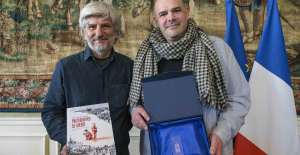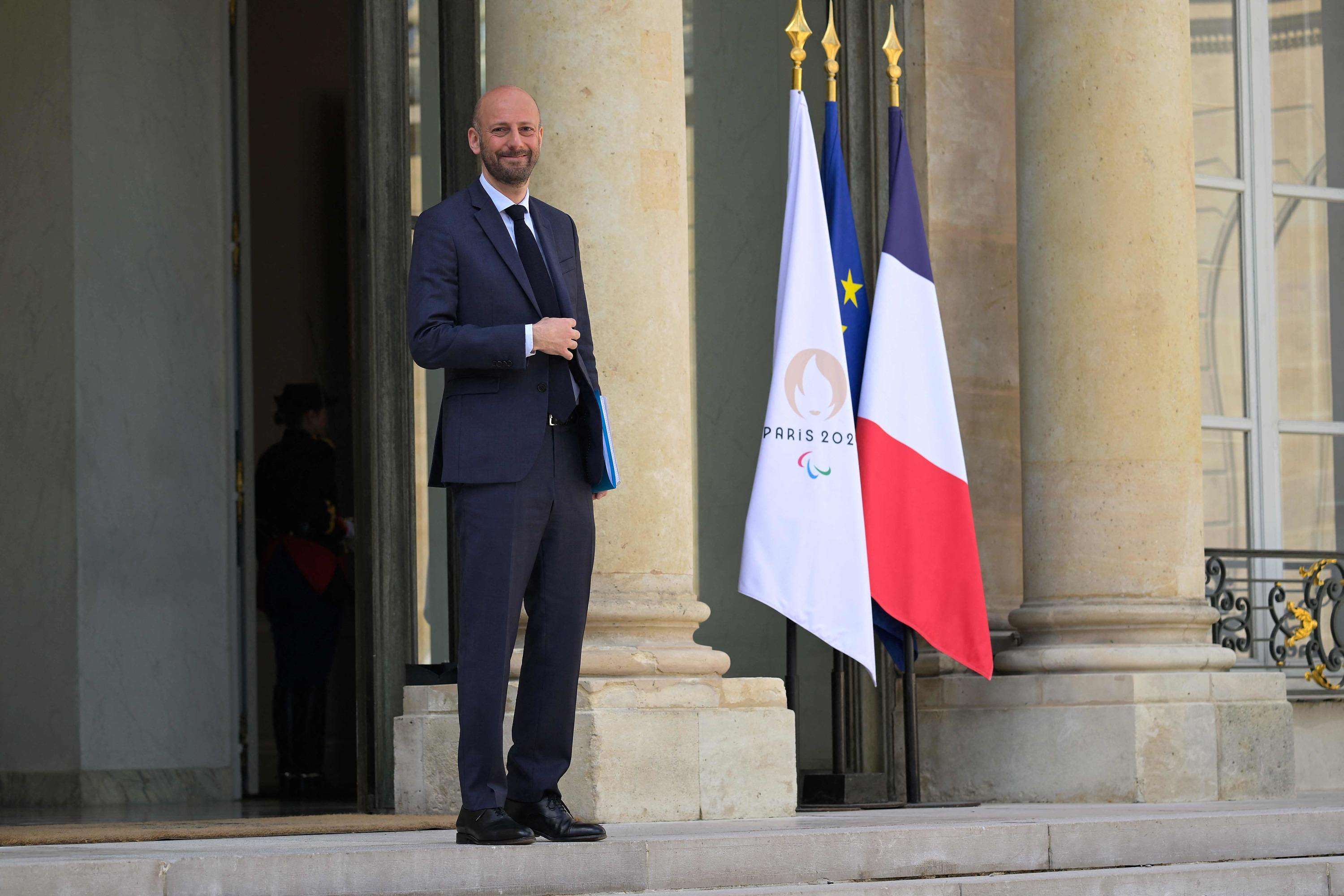Florian Hildebrand hates detours. For his latest company, the tech founder simply wrote to several German universities and asked two questions: Are you working on a technology that is changing the world? And do you need an investor for that? Hildebrand found what he was looking for in Essen.
Scientist Peter Behr has been researching there for 15 years to filter CO₂ from the air and make it usable for industry. He believes he has found a particularly energy-saving and practical process. At least that's how Hildebrand reports about the emergence of the joint start-up Greenlyte last September.
"The topic captures the zeitgeist, the technology is very promising," says Hildebrand in his first interview about the start-up. "I hope that this story will also motivate other founders to produce even more ClimateTech in Germany."
In fact, there is a need to catch up – despite a whole series of successful German founders. Because the undisputed pioneering role in climate protection, which Germany would like to see itself in, it does not take on, at least in the start-up scene. This is shown by a previously unpublished study by Fox Corporate Finance (FCF). The Munich-based company financier has looked at start-ups that can make a contribution to climate protection - known in the scene as CleanTech or ClimateTech.
Accordingly, in the past five years, Germany has only ranked third behind Great Britain and France in terms of the number of venture capital financings in this area. When it comes to the total sum, even the poorly populated Sweden (EUR 6.4 billion) is ahead of Great Britain (EUR 4 billion) and Germany (EUR 2.8 billion).
Germany doesn't look bad in a comparison of numbers, says FCF expert Florian Theyermann - but: "We often think that Germany leads in green technology. But other countries achieve more in relation to their size.”
The example of Sweden shows how individual cases of success can attract large investments to a country. With the battery manufacturer Northvolt and the electric truck developers Einride and Volta Trucks, the Nordic country has three highly financed young companies, catapulting itself to the top of the FCF statistics.
The potential for such successes also exists in Germany. Because technologies for climate protection are becoming more attractive for investors and founders. Magnus Grimeland, head of the global start-up financier Antler, which supports 600 founders worldwide, is now also focusing on CleanTech.
A quarter of the 250 European companies in its portfolio deal with sustainability. This includes the Berlin start-up Neocarbon, which wants to filter CO₂ out of the atmosphere using existing cooling towers in industrial plants. Also in Berlin is Novo, which wants to advise homeowners on the climate-friendly conversion of their houses and offers financing for this.
"The issue is high on the agenda of every government and every corporation," says Grimeland, who supported the founder from the very beginning. At the same time, new technology can protect the climate and increase efficiency, for example by saving energy. "More and more people understand that ClimateTech needs a business model that is not based on pure altruism," says the Norwegian, who lives in Singapore. A lot of capital is therefore available from institutional investors - even in the current situation, in which it has become more difficult for eCommerce start-ups to find money.
In Europe and Germany, the Harvard graduate sees particularly great opportunities for start-ups in this area, after all the EU countries are investing a lot in climate protection. "Then the best companies should also be created here," he says. Grimeland hopes that European start-ups could become leaders in this “very large” global market in the next ten years.
Apparently Google recognizes this too. The US group will start a funding program for climate start-ups in Munich on Monday. 14 young companies from Europe and Israel receive start-up support in a ten-week program. Among them are three German foundations.
On Tuesday, the Hamburg home technology provider 1Komma5° announced a new round of financing of over 200 million euros. Former Tesla Germany boss Philipp Schröder offers private homeowners technology from solar roofs to heat pumps, including installation and energy contracts. Sales should increase to 200 million euros in 2023, Schröder told the “Handelsblatt”.
According to the FCF study, however, only two of the top ten European start-ups that have collected the most money come from Germany. On the one hand the solar service provider Enpal, which equips private houses. He has received 271 million euros in venture capital.
On the other hand Infarm, founded in Berlin. The company develops automated greenhouses for herbs and lettuce - for use directly in supermarkets, but also for larger systems. The technology still needs a lot of energy, but the founders hope that it will make a positive contribution to feeding the world in the long term. They have raised 518 million euros in venture capital so far. But the difficult economic situation also affects Infarm: At the end of last year, the company cut around half of its almost 1,000 jobs and withdrew from some foreign markets.
The energy storage developer Sonnen from Dresden, financed by Shell, and the Enpal competitor Zolar also attracted attention with larger rounds of financing.
However, the German climate founders are currently also reporting the bankruptcy of a highly traded start-up: the solar car developer Sonar is giving up – despite numerous pre-orders.
On the other hand, there are successful sales of start-ups, with which the venture capitalists secure their returns: In Germany last year, Samsung took over the Baden-Württemberg OLED developer Cynora, who is working on economical screens, for 283 million euros. A year earlier, Shell acquired the Cologne-based eco-electricity trader Next for EUR 150 million. However, there have been no major IPOs in this area in Germany so far, which have mainly taken place in Scandinavia and France.
FCF expert Theyermann sees a reason behind the relative weakness of the German climate start-up scene that speaks in favor of the location: the strong German large-scale industry develops its own solutions and thus attracts university graduates. In Great Britain, on the other hand, young engineers are more often left to their own devices and therefore more often found their own companies. That could be one reason why German start-ups in the climate sector are less talked about.
But the increased chances of success are now attracting more and more experienced founders from the German tech scene to switch to the climate field. Founding a company is not a new experience for Greenlyte boss Hildebrand either – otherwise he would not have thrown himself into the project head over heels. He had already co-founded the Frankfurt chemical certification platform Qualifyze.
The start-up capital for the latest project came from the partial sale of his first company – and his knowledge of what convinces start-up financiers. The ideas for Greenlyte envisage, for example, making the technology flexibly usable via containers and linkable via the cloud - two points that start-up financiers like to see.
At its core, however, it is about chemistry that binds captured CO₂ in a salt and is said to require less energy for this than other processes that are currently being developed around the world. The solidified CO₂ can be further processed, for example into fuel.
Greenlyte has already bought the patents for this from the University of Duisburg-Essen. Investors such as the Berlin early-stage financiers Earlybird and Green Generation Fund as well as the specialized Swiss investor Carbon Removal Partners are already on board. The co-founder of the German flagship climate protection start-up, Schröder von 1Komma5°, has also invested.
The eleven-strong Greenlyte team wants to use the money to set up a first pilot plant this year. The founders hope to be able to prove the favorable energy balance in order to start with a pilot industrial customer in the coming year - and then to be able to set up sales and production. It cannot be ruled out that Greenlyte will become a success case that will push Germany up the ClimaTech statistics in a few years.
"Everything on shares" is the daily stock exchange shot from the WELT business editorial team. Every morning from 7 a.m. with our financial journalists. For stock market experts and beginners. Subscribe to the podcast on Spotify, Apple Podcast, Amazon Music and Deezer. Or directly via RSS feed.

 B:SM will break its investment record this year with 62 million euros
B:SM will break its investment record this year with 62 million euros War in Ukraine: when kyiv attacks Russia with inflatable balloons loaded with explosives
War in Ukraine: when kyiv attacks Russia with inflatable balloons loaded with explosives United States: divided on the question of presidential immunity, the Supreme Court offers respite to Trump
United States: divided on the question of presidential immunity, the Supreme Court offers respite to Trump Maurizio Molinari: “the Scurati affair, a European injury”
Maurizio Molinari: “the Scurati affair, a European injury” Beware of the three main sources of poisoning in children
Beware of the three main sources of poisoning in children First three cases of “native” cholera confirmed in Mayotte
First three cases of “native” cholera confirmed in Mayotte Meningitis: compulsory vaccination for babies will be extended in 2025
Meningitis: compulsory vaccination for babies will be extended in 2025 Spain is the country in the European Union with the most overqualified workers for their jobs
Spain is the country in the European Union with the most overqualified workers for their jobs In the United States, a Boeing 767 loses its emergency slide shortly after takeoff
In the United States, a Boeing 767 loses its emergency slide shortly after takeoff The A13 motorway will not reopen on May 1
The A13 motorway will not reopen on May 1 More than 1,500 items for less than 1 euro: the Dutch discounter Action opens a third store in Paris
More than 1,500 items for less than 1 euro: the Dutch discounter Action opens a third store in Paris 100 million euros in loans, water storage, Ecophyto plan… New measures from the executive towards farmers
100 million euros in loans, water storage, Ecophyto plan… New measures from the executive towards farmers New York justice returns 30 works of art looted from Cambodia and Indonesia
New York justice returns 30 works of art looted from Cambodia and Indonesia Les Galons de la BD dedicates War Photographers, a virtuoso album on the Spanish War
Les Galons de la BD dedicates War Photographers, a virtuoso album on the Spanish War Theater: Kevin, or the example of an academic failure
Theater: Kevin, or the example of an academic failure The eye of the INA: Jean Carmet, the thirst for life of a great actor
The eye of the INA: Jean Carmet, the thirst for life of a great actor Skoda Kodiaq 2024: a 'beast' plug-in hybrid SUV
Skoda Kodiaq 2024: a 'beast' plug-in hybrid SUV Tesla launches a new Model Y with 600 km of autonomy at a "more accessible price"
Tesla launches a new Model Y with 600 km of autonomy at a "more accessible price" The 10 best-selling cars in March 2024 in Spain: sales fall due to Easter
The 10 best-selling cars in March 2024 in Spain: sales fall due to Easter A private jet company buys more than 100 flying cars
A private jet company buys more than 100 flying cars This is how housing prices have changed in Spain in the last decade
This is how housing prices have changed in Spain in the last decade The home mortgage firm drops 10% in January and interest soars to 3.46%
The home mortgage firm drops 10% in January and interest soars to 3.46% The jewel of the Rocío de Nagüeles urbanization: a dream villa in Marbella
The jewel of the Rocío de Nagüeles urbanization: a dream villa in Marbella Rental prices grow by 7.3% in February: where does it go up and where does it go down?
Rental prices grow by 7.3% in February: where does it go up and where does it go down? Even on a mission for NATO, the Charles-de-Gaulle remains under French control, Lecornu responds to Mélenchon
Even on a mission for NATO, the Charles-de-Gaulle remains under French control, Lecornu responds to Mélenchon “Deadly Europe”, “economic decline”, immigration… What to remember from Emmanuel Macron’s speech at the Sorbonne
“Deadly Europe”, “economic decline”, immigration… What to remember from Emmanuel Macron’s speech at the Sorbonne Sale of Biogaran: The Republicans write to Emmanuel Macron
Sale of Biogaran: The Republicans write to Emmanuel Macron Europeans: “All those who claim that we don’t need Europe are liars”, criticizes Bayrou
Europeans: “All those who claim that we don’t need Europe are liars”, criticizes Bayrou These French cities that will boycott the World Cup in Qatar
These French cities that will boycott the World Cup in Qatar Toulouse-Racing 92: The liberating entry of Antoine Dupont, the Ile-de-France shipwreck... The tops and the flops
Toulouse-Racing 92: The liberating entry of Antoine Dupont, the Ile-de-France shipwreck... The tops and the flops Premier League: Sheffield United relegated after heavy defeat against Newcastle
Premier League: Sheffield United relegated after heavy defeat against Newcastle Judo: Audrey Tcheuméo consoles herself with a 5th European coronation
Judo: Audrey Tcheuméo consoles herself with a 5th European coronation Tennis: in Madrid, Rafael Nadal wins his revenge against Alex De Minaur
Tennis: in Madrid, Rafael Nadal wins his revenge against Alex De Minaur


















